The Best CPU for Gaming in 2025
Here is the best CPU for gaming.

Our picks below will show you the best CPU for gaming. Of course, when shopping for the best CPU for gaming, you'll want to balance performance and features with your budget. You can also see how all of these processors stack up in our CPU benchmarks hierarchy, and for detailed help on picking the best processor, you can check out our 2024 CPU Buying Guide. And if you're on the fence about which CPU maker to go with, our AMD vs. Intel article dives deep into the topic and comes up with a winner.
AMD's Ryzen 7 9800X3D is now the fastest gaming chip on the planet, and it isn't even close — the fastest AMD CPU for gaming is a whopping 35% faster in 1080p gaming than Intel's competing flagship Core Ultra 9 285K, and 30% faster than Intel's previous-gen flagship, the Core i9-14900K. This chip has been hard to find, but it's definitely worth continuing to look for.
The 9800X3D is on the pricey side with a $480 MSRP, and its limited availability often finds it selling for far higher pricing, but this chip delivers the pinnacle of gaming performance. AMD's previous-gen Ryzen 7 7800X3D is still a great buy for gaming, and we expect to see good sales on it now that it is officially a last-gen product, but it does lag the 9800X3D by 15% in gaming. However, AMD has also improved the 9800X3D's performance in applications, giving it another advantage over the prior-gen model.
We recently reviewed AMD's new Ryzen 9 9900X3D, but we found that the chips' close proximity to the company's own other gaming chips makes the price tag hard to justify. You shouldn't opt for this chip unless we see a significant drop in pricing.
If you need bleeding-edge gaming performance and the full performance in productivity work, the higher-tier Ryzen 9 9950X3D is the chip for you. Zero compromises. That was AMD's mission when it designed the 9950X3D; from our testing, that mission was a rousing success. The second-gen revision of 3D V-Cache propels the 16-core, 32-thread $699 Ryzen 9 9950X3D to a whole new level of gaming performance — all while preserving the full performance in productivity applications, a first for AMD's gaming-optimized X3D chips.
AMD's standard Ryzen 9000 models made a somewhat underwhelming debut due to lackluster gen-on-gen gaming performance improvements, but recent firmware and operating system tweaks that improved performance, not to mention some price cuts, have made them far more competitive. As such, we've added the Ryzen 5 9600X and Ryzen 7 9700X to our list for their strong level of gaming performance at their price points.
Here's the shortlist of our buying recommendations — use the 'More' links, or just simply scroll down the page, to jump to a more detailed description of each processor and its alternatives:
Best CPU for Gaming in 2025 at a glance (more info below):
CPU | Best CPU for Gaming | Alternate |
|---|---|---|
Overall Best CPU for Gaming: $300 to $400 | ||
Mid-Range Best CPU for Gaming: $200 to $300 | ||
Highest Performance Best CPU for Gaming: $400+ | ||
Budget Best CPU for Gaming: $100 to $150 | ||
Entry-Level Best CPU for Gaming: (iGPU) |
The list below is for the best CPUs for gaming, while our list of best CPUs for workstations is for those who frequently tackle high-end content creation or professional work, while the best budget CPUs can help you find a cheap chip. Processors benefit from the best thermal paste, so check out our guide if you're shopping for a new processor. But if you're after the best CPU for gaming, you're in the right place.
Best CPU for Gaming Benchmarks
Why you can trust Tom's Hardware
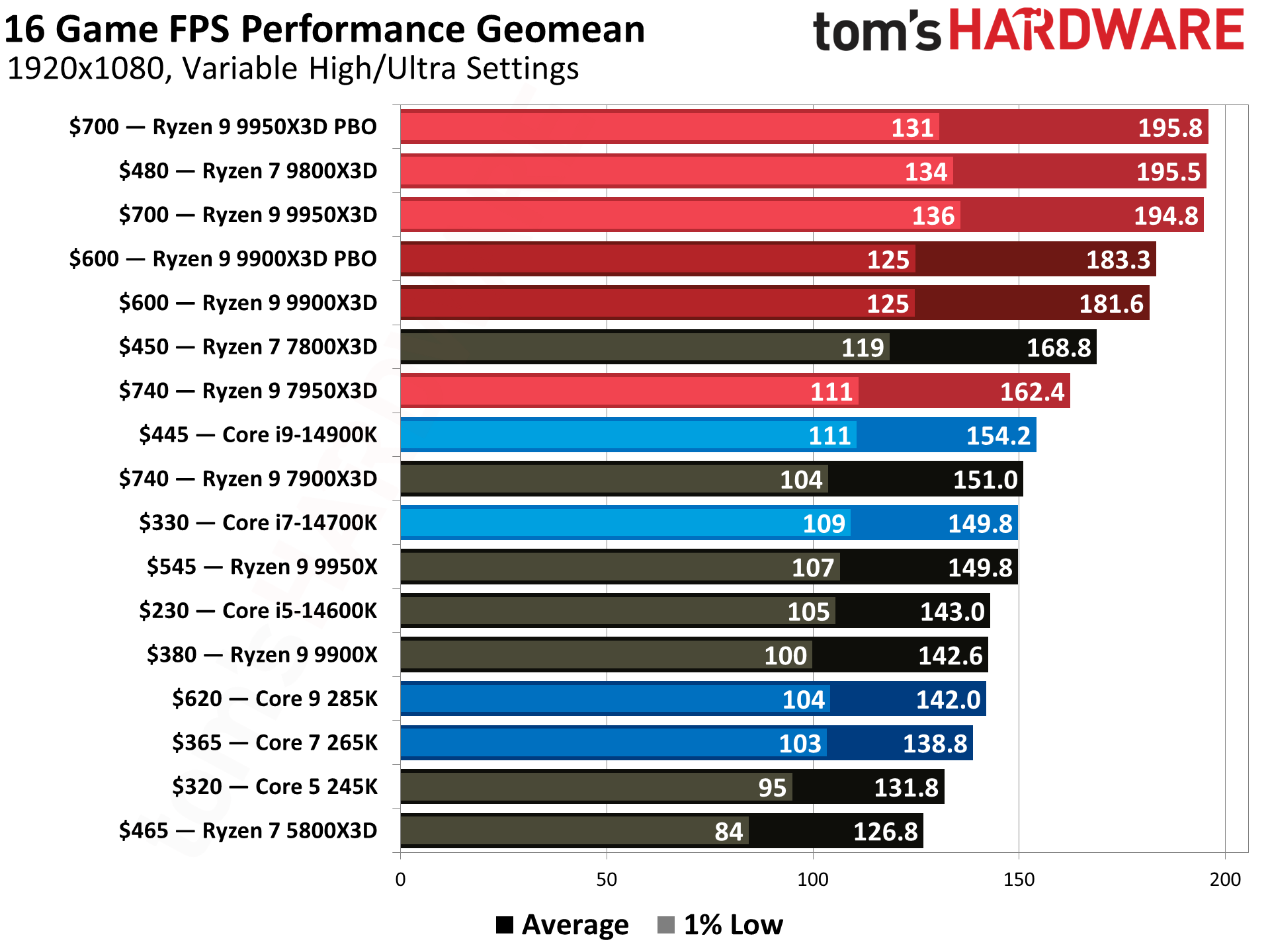
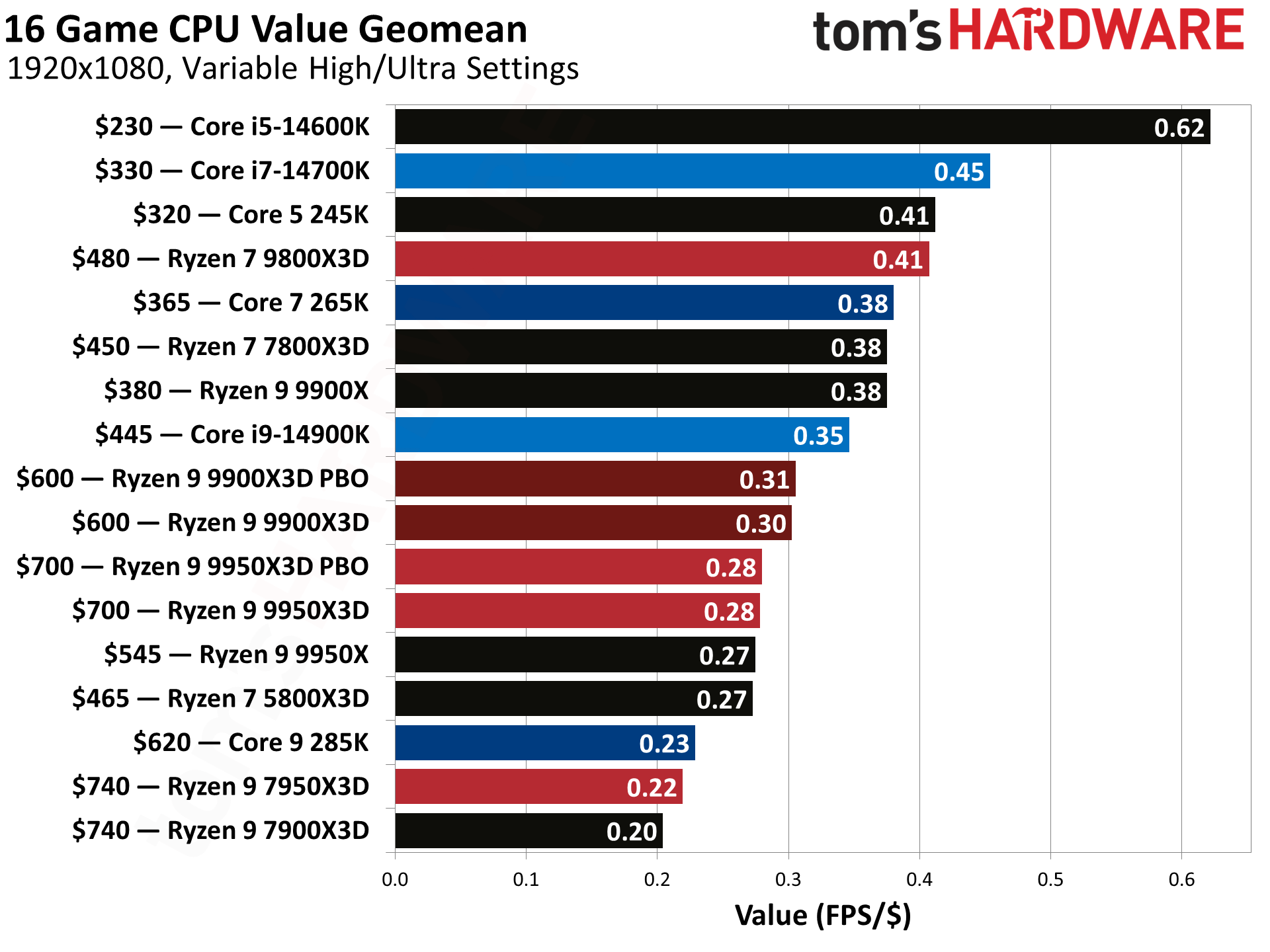
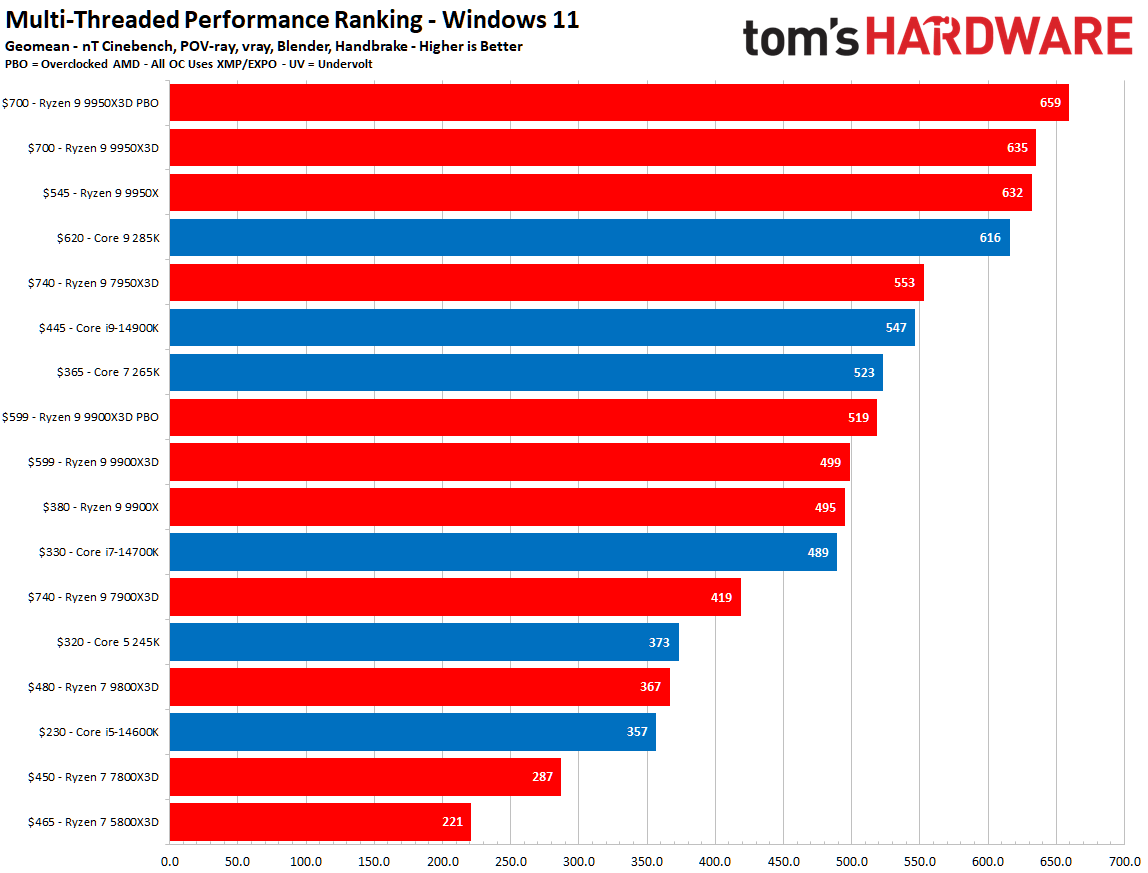
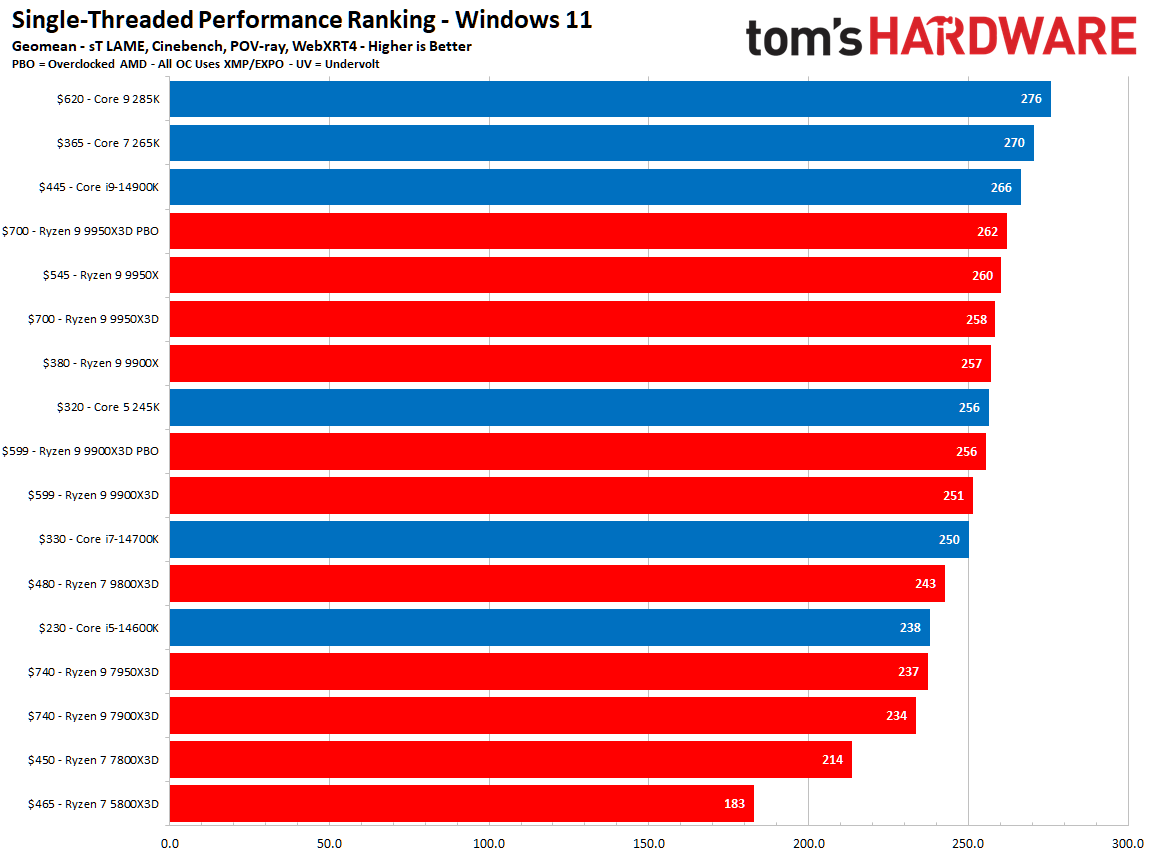
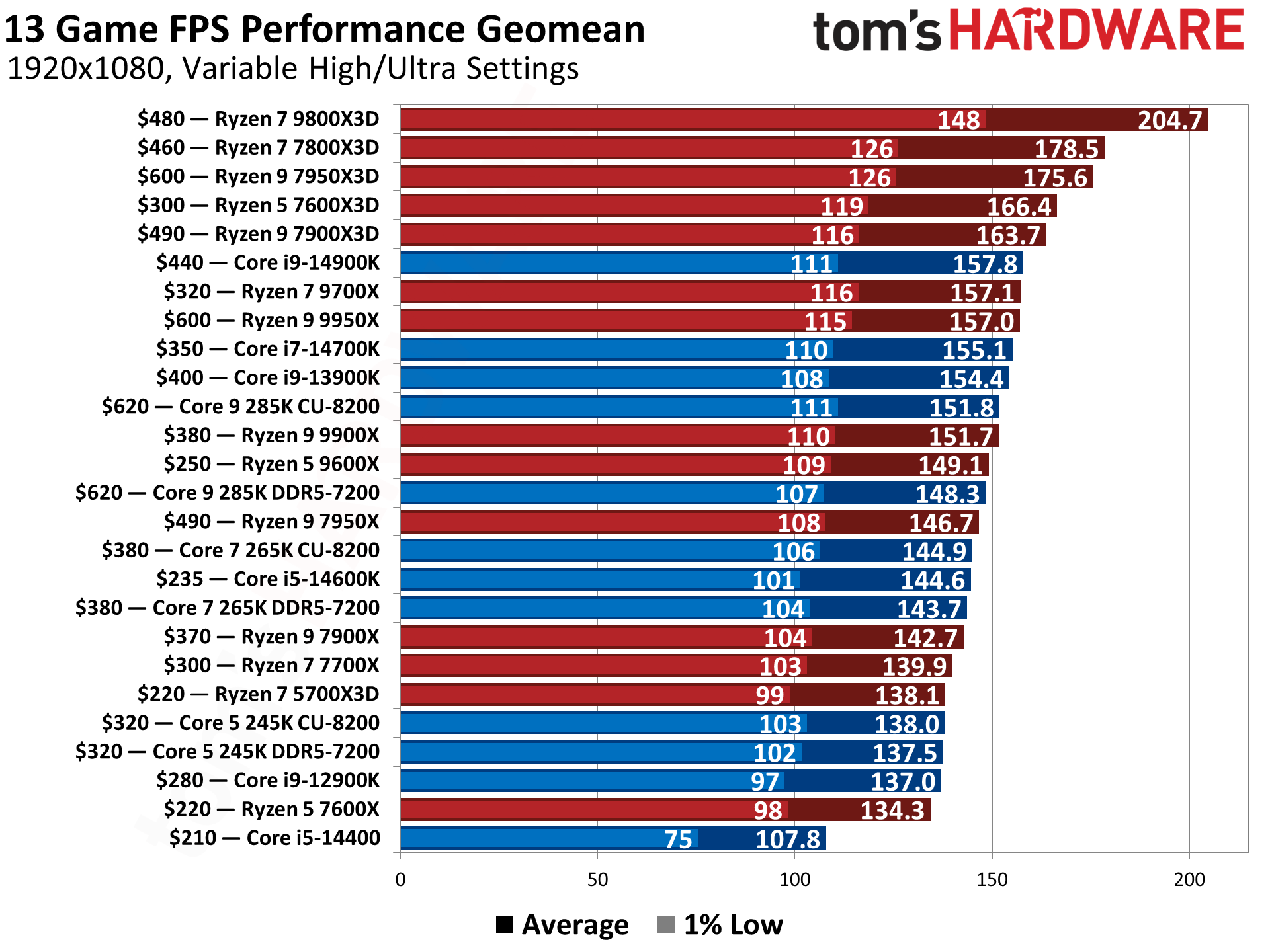
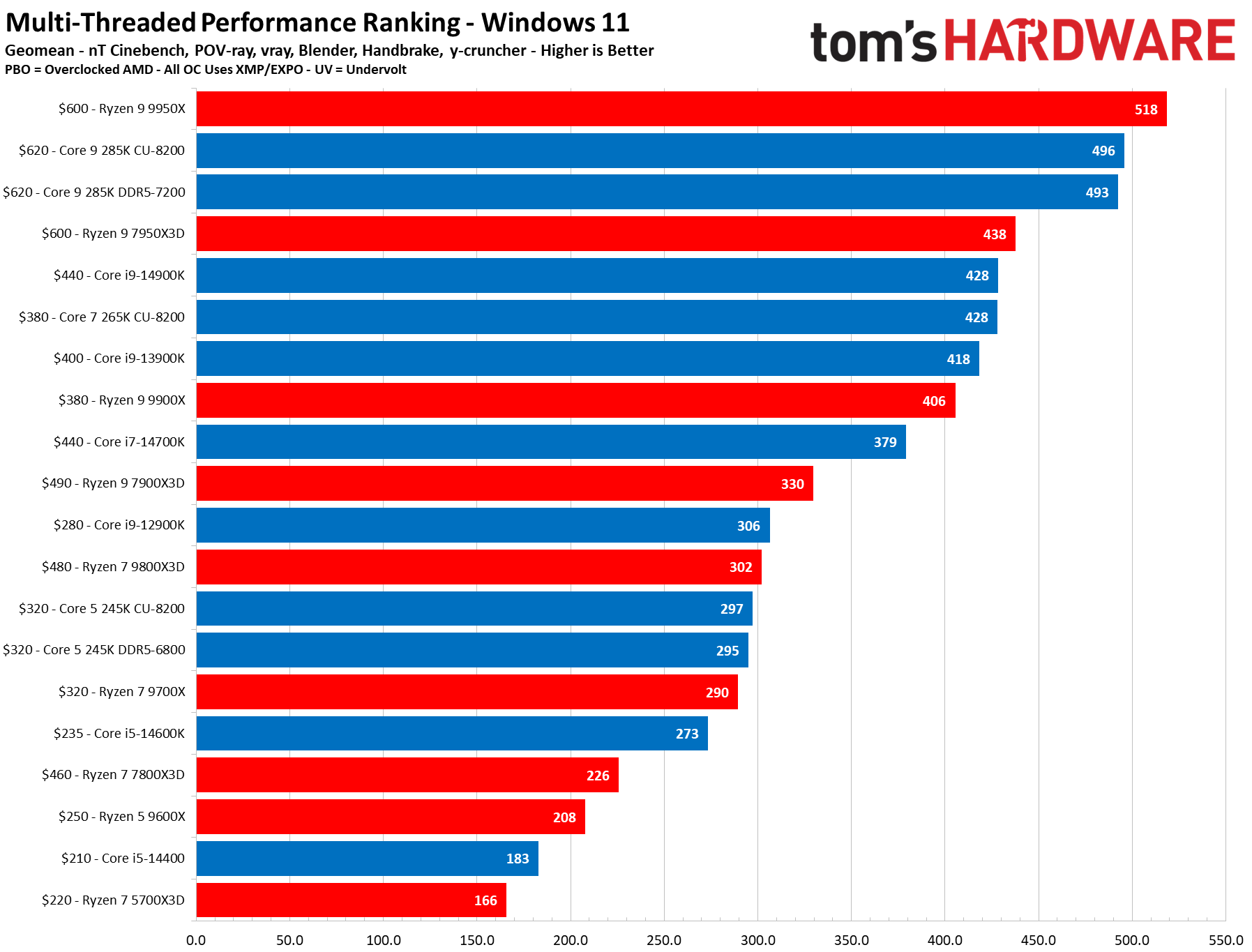
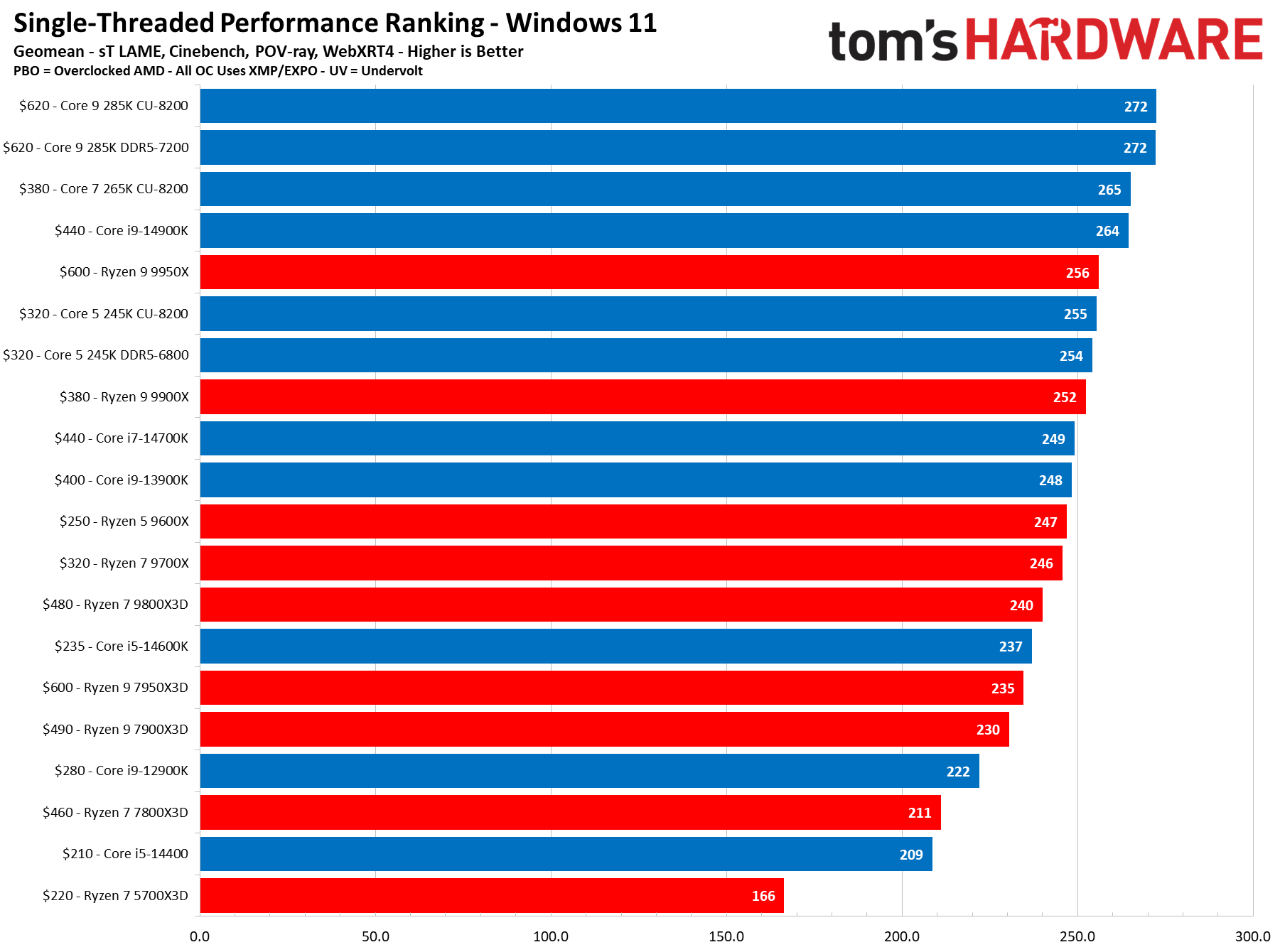
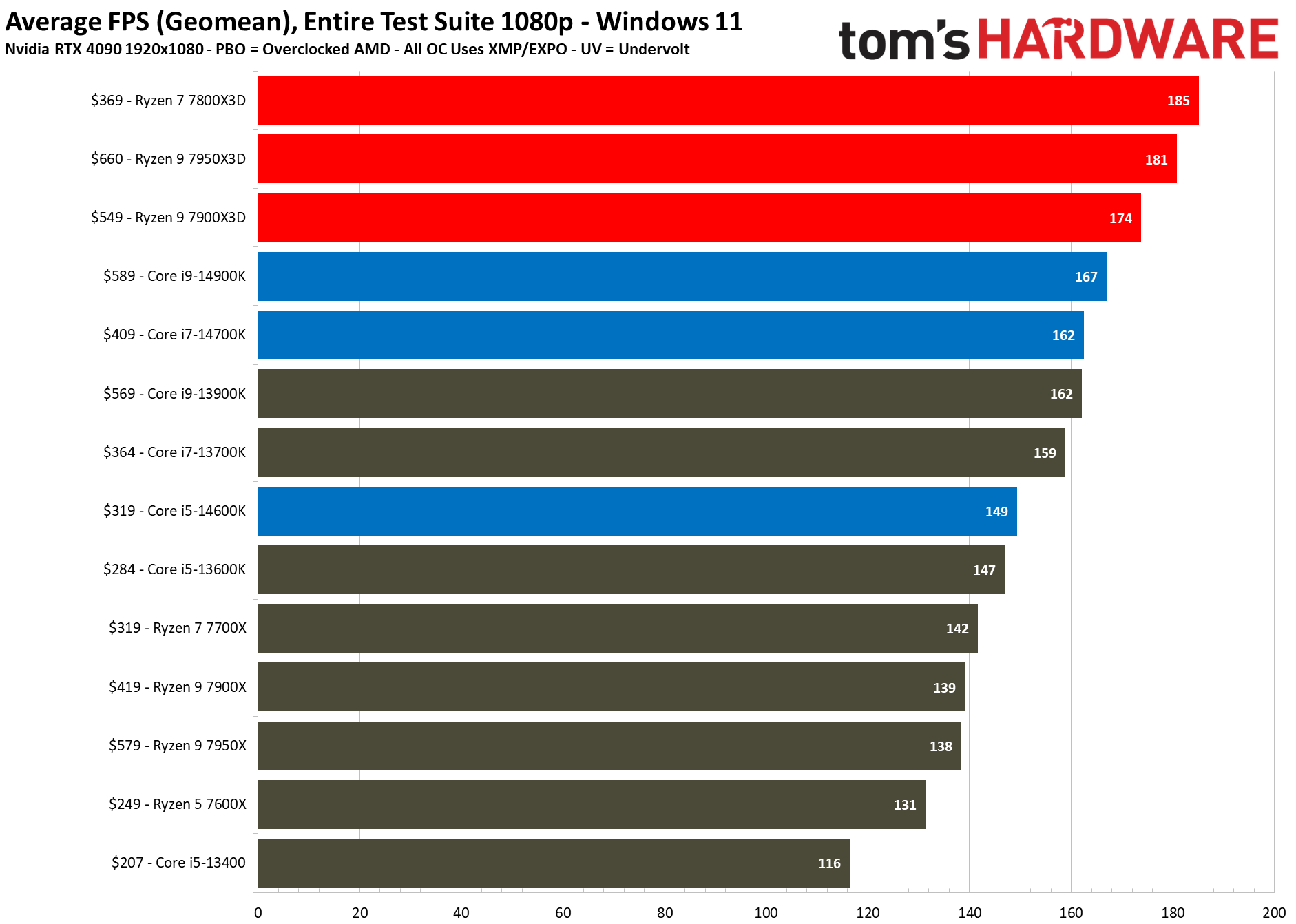
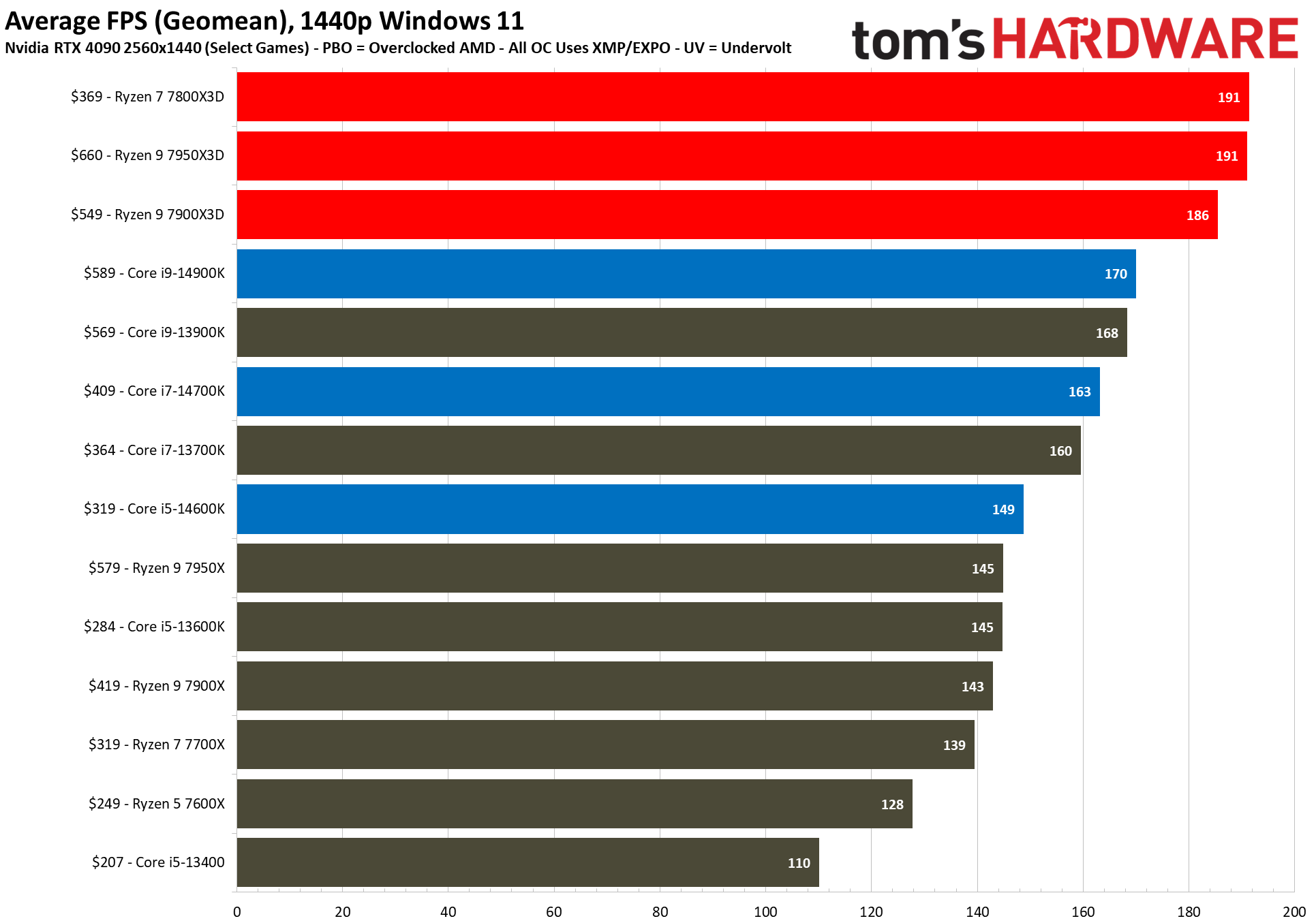
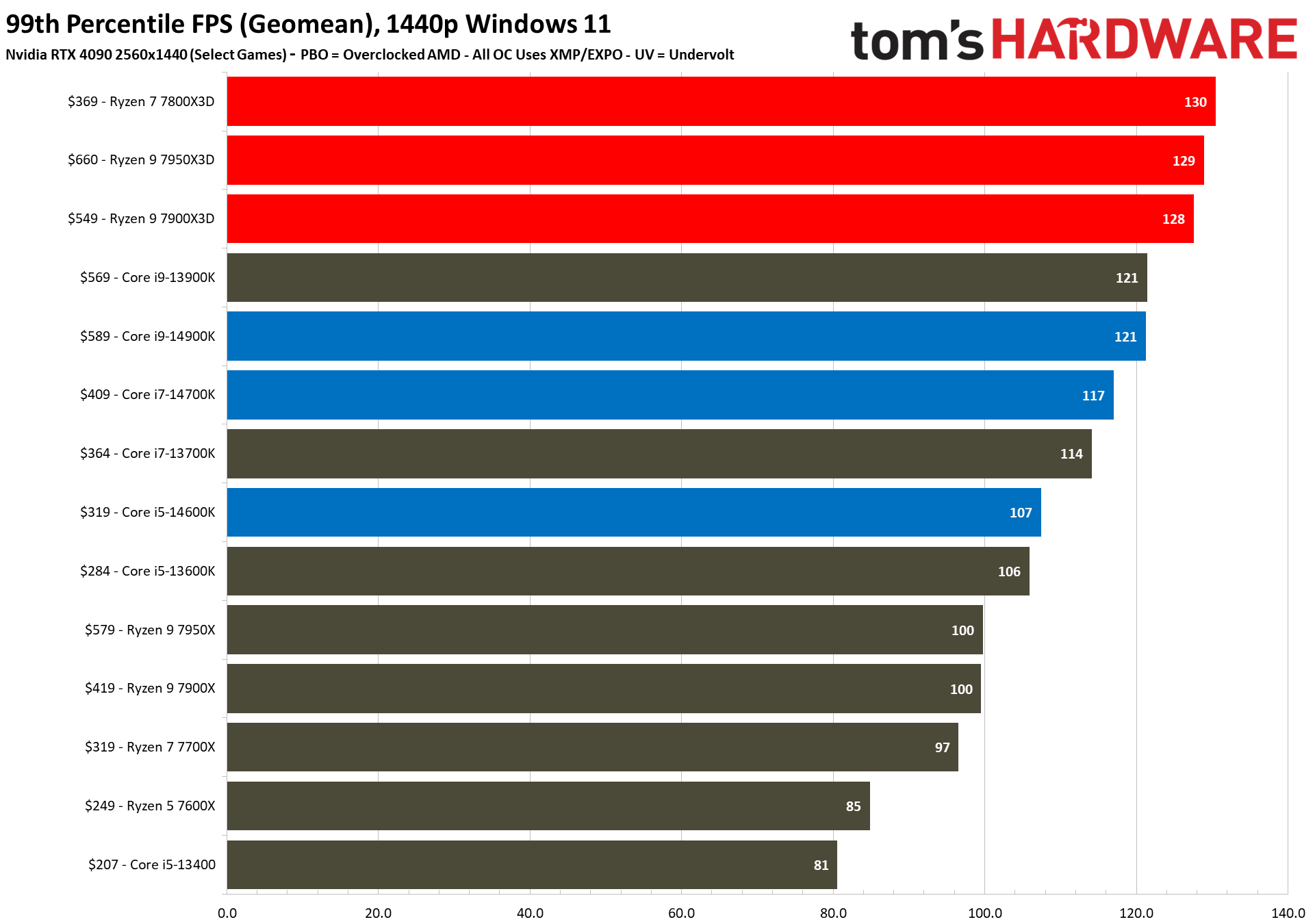
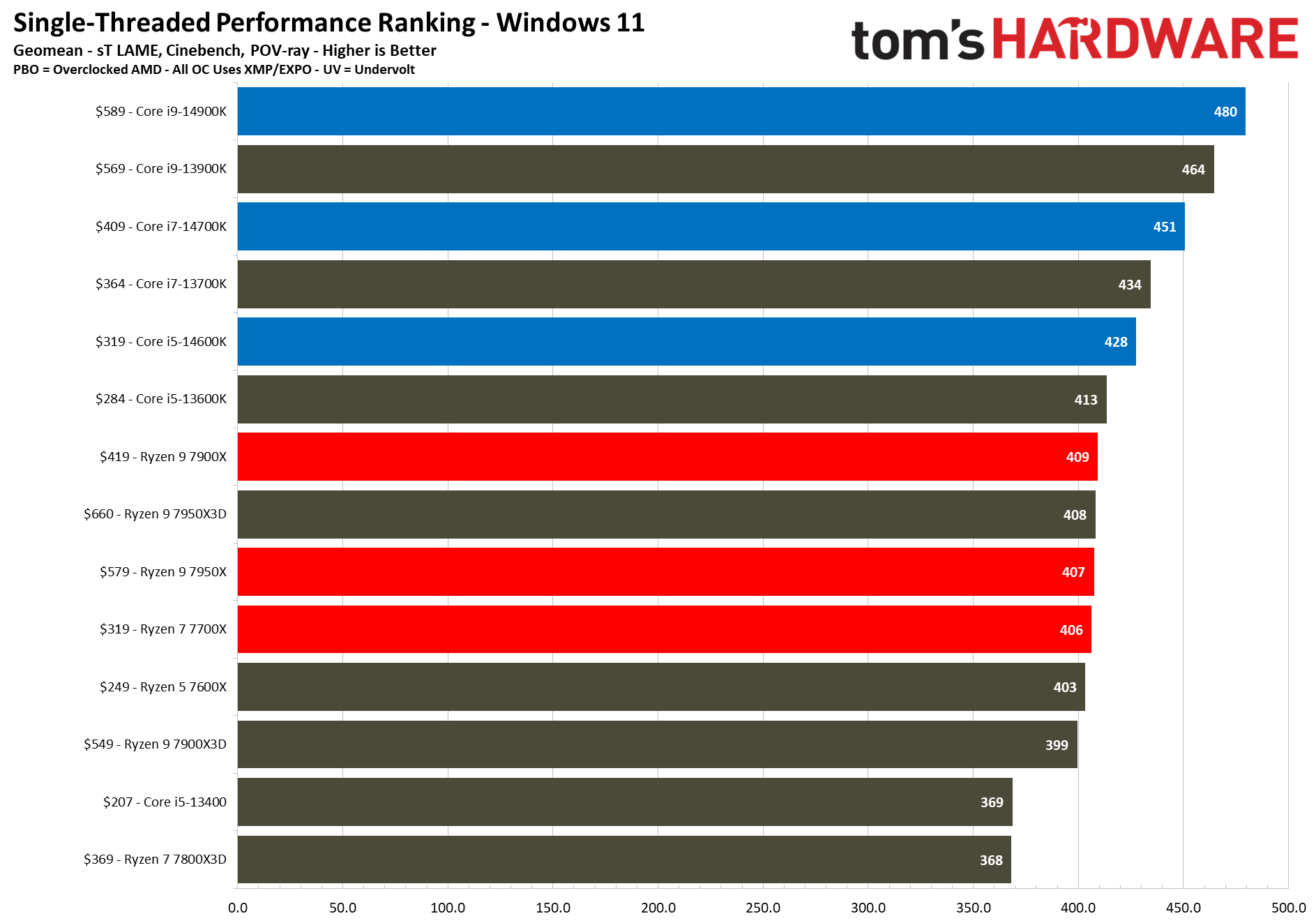
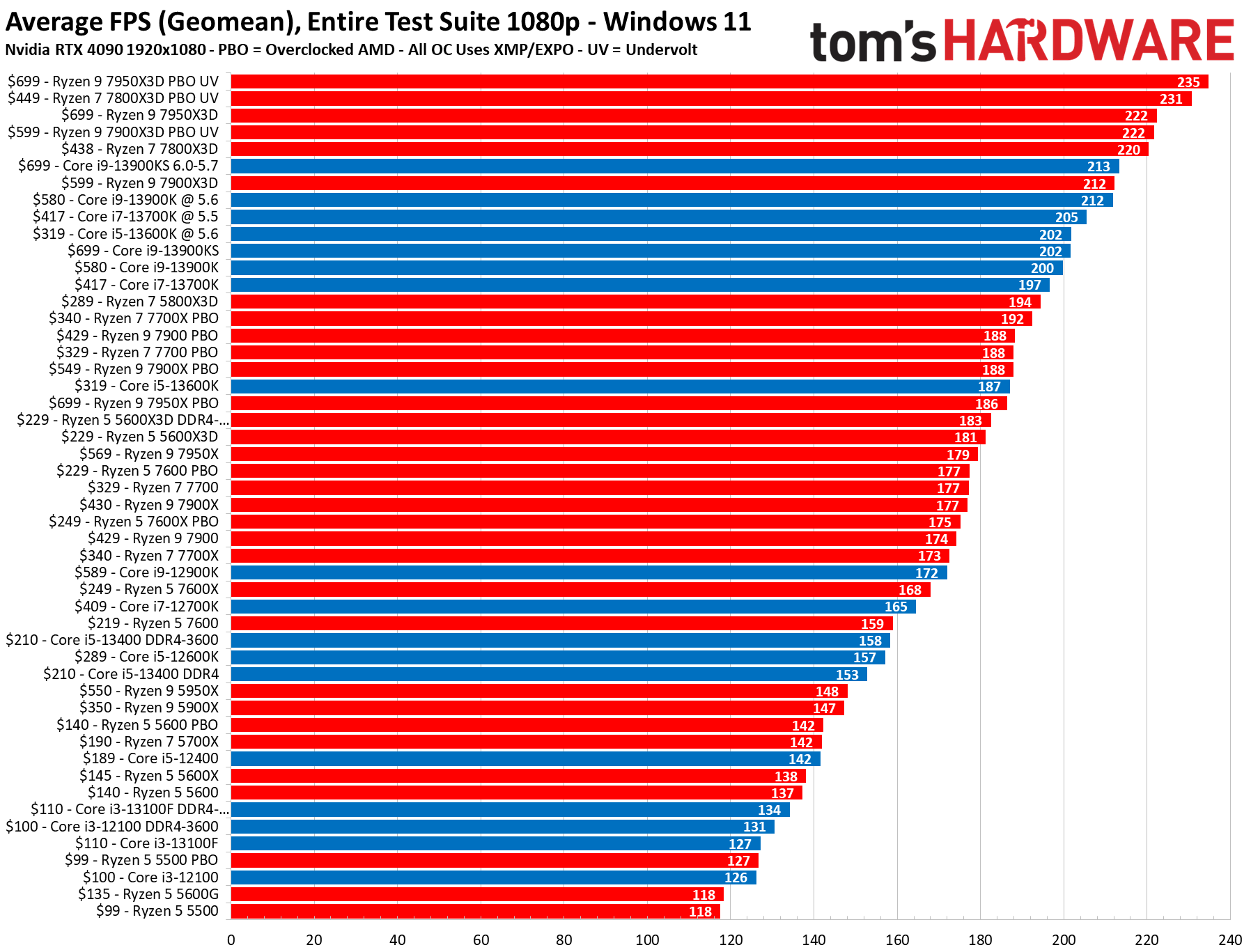
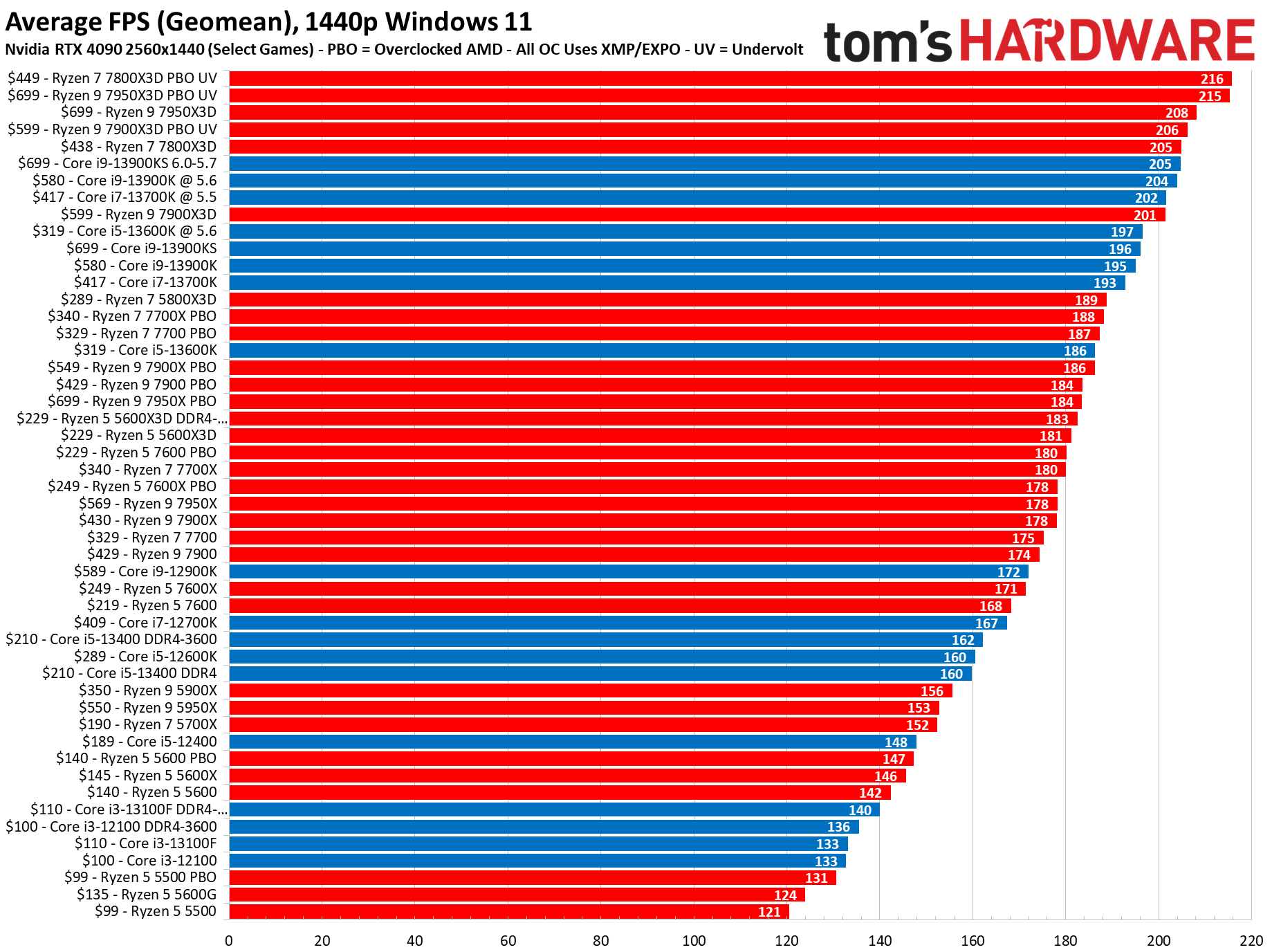
We rank all the Intel and AMD processors based on our in-depth CPU benchmarks hierarchy. You can see some of those numbers in the charts above, including CPU overclock performance results (marked as PBO for AMD processors). We're currently retesting all of these processors with the Nvidia RTX 5090, but only the first four slides have that testing. The remainder are historical testing results with the RTX 4090, which we'll remove once we have fully retested all of the gaming CPUs with the RTX 5090 for our benchmarks. This group of results comprises only the chips that have passed through our newest test suite. Additionally, the tables in our CPU benchmark hierarchy include rankings based on past CPU benchmarks and breakdowns of single- and multi-threaded performance in productivity applications across a broad spate of processors. Finally, be aware that the pricing in the charts above can fluctuate.
Quick Shopping Tips
When choosing the best CPU for gaming in 2025, consider the following:
- You can't lose with AMD or Intel: As noted in our AMD vs. Intel feature, AMD tends to make the best all-around CPU for gaming for mainstream PCs lately, but both offer compelling performance options at any given price point.
- For gaming, clock speed is generally more important than the number of cores: Higher CPU clock speeds generally translate to snappier performance in simple tasks like gaming, while more cores will help you get through heavy workloads faster.
- Budget for a full system: Don't pair a strong CPU with weak storage, RAM, and graphics.
- Overclocking isn’t for everyone, but if you follow our How to Overclock a CPU guide, you can scrape out extra performance gains.
Best CPU for Gaming 2025 - $300 to $400
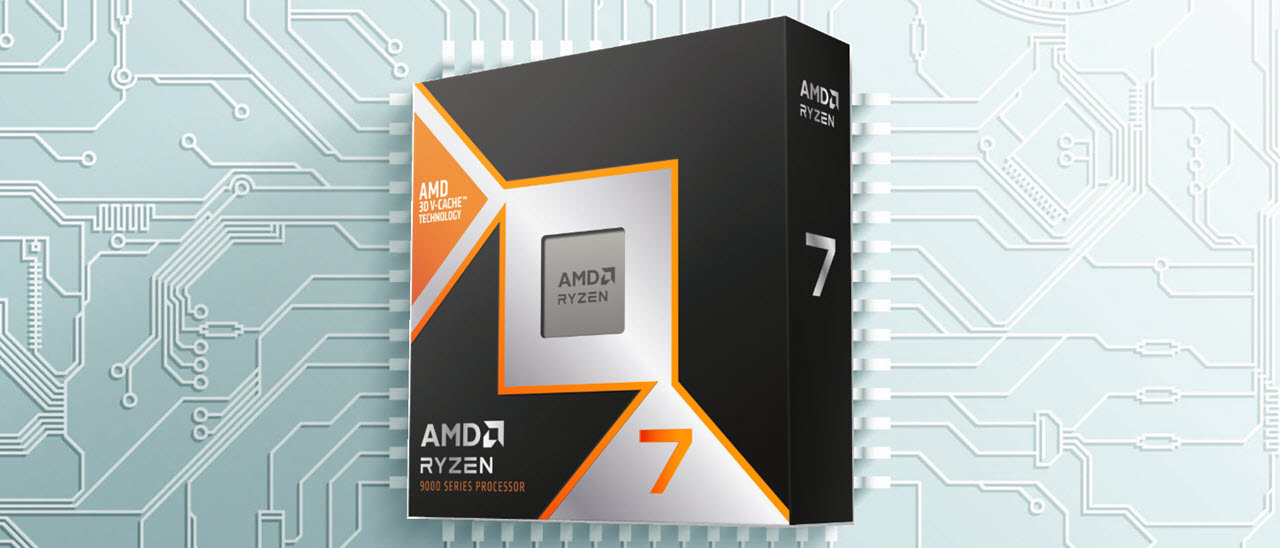
Specifications
Reasons to buy
Reasons to avoid
The Ryzen 7 9800X3D is not only AMD's fastest gaming chip but also the fastest available on the market. It easily beats Intel's more expensive competitors, not to mention AMD's own lineup. At $480, the Ryzen 7 9800X3D is both the fastest gaming CPU on the market and a solid value in the high-performance category.
This chip really has no peer in the market — the Ryzen 7 9800X3D delivers outstanding gaming performance, beating Intel's fastest gaming chip, the $440 Core i9-14900K, by 30% in our test suite. The 9800X3D is also almost unbelievably 35% faster than the current-gen Intel flagship, the $629 Core Ultra 9 285K. The stock Ryzen 7 9800X3D's 1% low frame rates (a good smoothness indicator) also deliver an exceptionally smooth gaming experience, benefiting gamers even in GPU-limited scenarios.
The Ryzen 7 9800X3D has eight cores and 16 threads that operate at a 4.7 GHz base and 5.2 GHz boost clock rate. The chip employs AMD's 3D V-Cache tech with a new spin, which places a 3D-stacked SRAM chiplet underneath the die to deliver an incredible 96MB of L3 cache to great effect. AMD moved the L3 cache chiplet from the top to the bottom of the compute die this generation to improve performance in productivity applications, and the end result is a comparatively low-power chip that delivers incredible gaming performance and comparable productivity performance to other eight-core models on the market.
You have to be aware of the tradeoffs with this highly specialized chip — our gaming benchmarks show that the 3D V-Cache doesn't boost performance in all games, though we found that it impacted nearly every title we tested.
The Ryzen 7 9800X3D has much lower power consumption than the Intel competition, making it a far cooler processor that won't require as expensive accommodations, like a beefy cooler, motherboard, and power supply. That means the 9800X3D delivers top-notch gaming performance and a cooler, quieter, and less expensive system than you'll get with an Ultra 9 or Core i9.
Read: AMD Ryzen 7 9800X3D Review
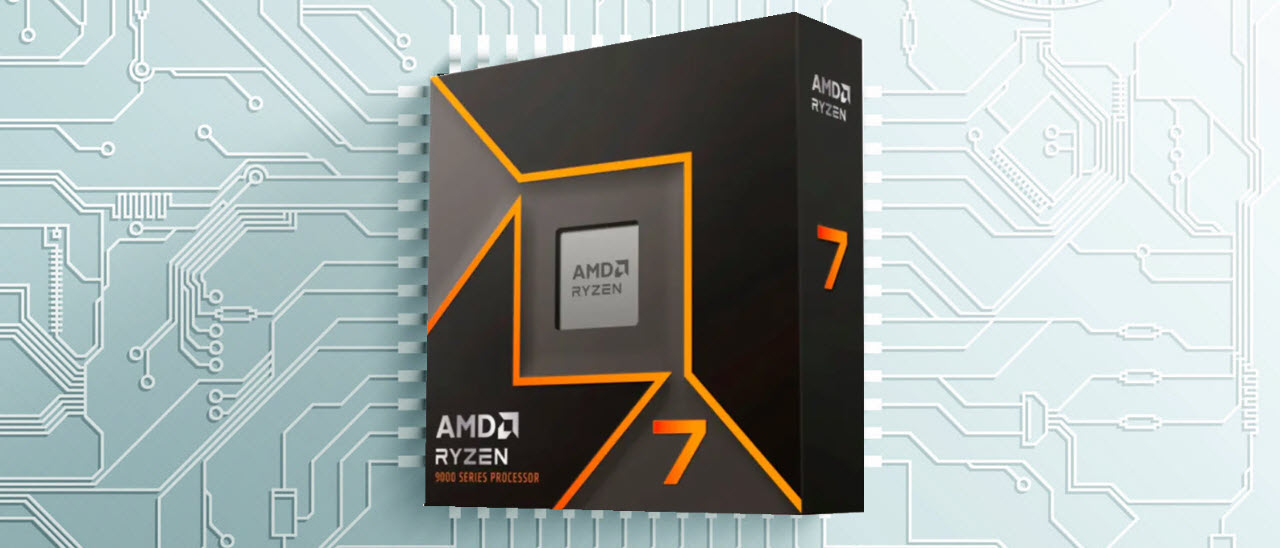
AMD Ryzen 7 9700X
Our expert review:
Specifications
Reasons to buy
Reasons to avoid
The $318 Ryzen 7 9700X had a rough initial product launch, but AMD's targeted firmware and operating system improvements have changed the picture tremendously, allowing the chip to place much higher on our CPU benchmark hierarchy (head there for the most up-to-date gaming benchmarks). Combined with its $40 lower-than-launch pricing, the Ryzen 7 9700X is a strong contender, tying Intel's Core i9-14900K in gaming and beating the Core i7-14700K, as well. That's not to mention that it beats Intel's entire lineup of new Core Ultra processors as well. Now, all of those processors offer faster performance in heavily-threaded productivity applications than the 9700X, but when it comes to just a pure gaming experience, the 9700X either ties or beats all competitors.
The Ryzen 7 9700X has eight Zen 5 cores with 16 threads that operate at a 3.8 GHz base and 5.5 GHz boost clock. The chip has a 65W TDP, though AMD retroactively added a 105W TDP option you can select in the BIOS that helps boost performance in productivity applications. With either setting, the 9700X has comparatively tame power consumption, so it is an easy chip to cool. You'll have to buy your own cooler for the processor, though.
The Ryzen 7 9700X drops into socket AM5 motherboards, and B-series motherboards make the most sense for this class of chip. AMD's partners have plenty of 600-series 'B' motherboards on the market that will make a good pairing with this chip. However, the much-anticipated B850 and B840 motherboards will not arrive until early next year.
Read: Ryzen 5 9700X Review
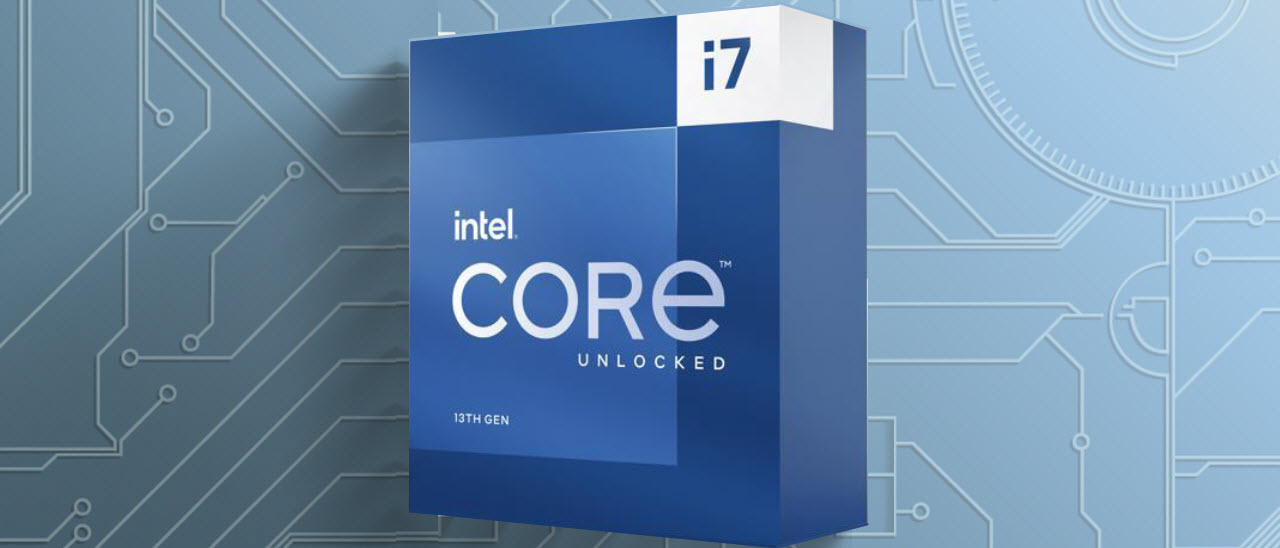
Intel Core i7-14700K
Our expert review:
Specifications
Reasons to buy
Reasons to avoid
Intel boosted the Core i7-14700K's core count by adding four more e-cores and tweaked the boost clock rate, but left its recommended pricing the same as the prior-gen model. At $339, the 14700K delivers essentially the same gaming performance as Intel's own flagship $435 Core i9-14900K — but for significantly less. You can also discard the integrated graphics engine and get the otherwise identical Core i7-14700KF for $327.
As always, if you aren't after top performance in heavy productivity tasks, the Core i7 model takes the shine off the Core i9. The Core i7-14700K is a great high-performance gaming chip at its price point, offering 97% of the flagship Core i9-14900K's performance for $90 less. Better yet, you can overclock the chip and get basically identical performance to the stock Core i9-14900K.
Our benchmarks show the Core i7-14700K is a much better all-rounder than Ryzen if you're looking for performance in productivity work. The Core i7-14700K has eight P-cores (high-performance) and 12 E-cores (efficiency), for a total of 28 threads. The P-cores run at a 3.4 / 5.6 GHz base/boost, while the E-cores weigh in at 2.5 / 4.3 GHz. In addition, the execution engine is fed by 33MB of L3 cache and 28MB of L2.
The 14700K also supports leading-edge connectivity with support DDR4-3200 or up to DDR5-5600 memory, along with 16 lanes of PCIe 5.0 and an additional four lanes of PCIe 4.0 from the chip for M.2 SSDs. The 14700K has a 125W PBP (base) and 253W MTP (peak) power rating.
You'll need to buy a capable cooler for the chip, and you'll also need a new 700-series or previous-gen 600-series motherboard. You can find a wide selection of high-end motherboards that support DDR5 memory, and although you'll only find lower-end and mid-range DDR4 motherboards, there's still plenty of selection available. Gamers will enjoy the lower price option of selecting DDR4, but it does come with 5 to 8% lower performance in gaming. You can upgrade to the slightly more expensive DDR5 if you need access to more memory throughput.
Read: Core i7-14700K Review
Mid-Range Best CPU for Gaming - $200 to $300
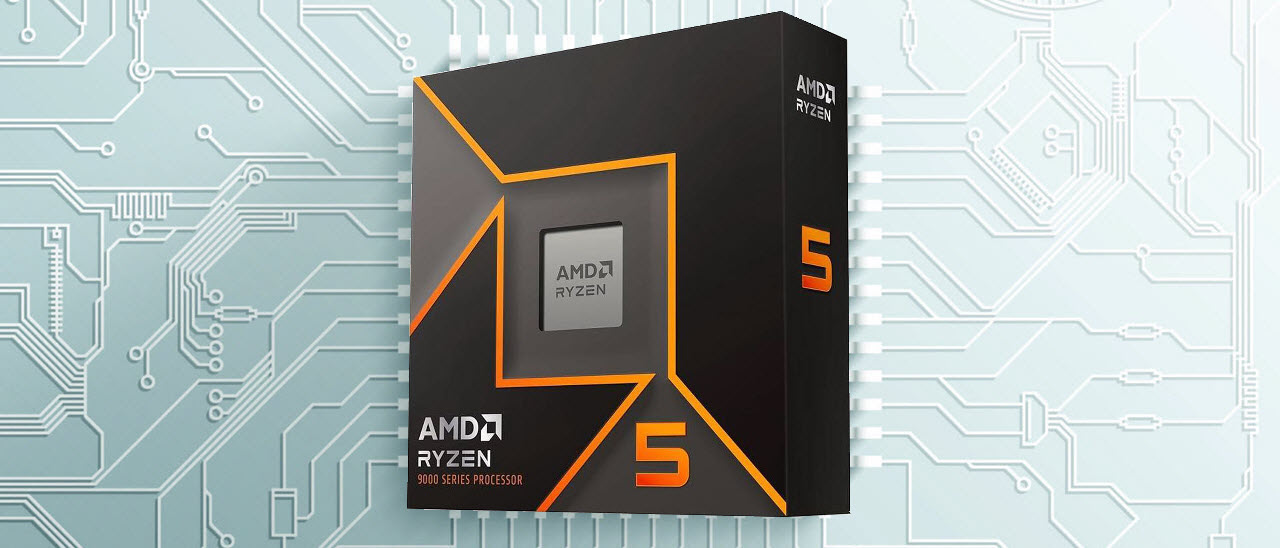
2. AMD Ryzen 5 9600X
Our expert review:
Specifications
Reasons to buy
Reasons to avoid
The $240 Ryzen 5 9600X had a rough start, but AMD's targeted firmware and operating system improvements have changed the picture tremendously, allowing the chip to place much higher on our CPU benchmark hierarchy (head there for the most up-to-date gaming benchmarks). Combined with its $40 lower-than-launch pricing, the Ryzen 5 9600X is a strong contender in the sub-$250 weight class.
The Ryzen 5 9600X has six Zen 5 cores with 12 threads that operate at a 3.9 GHz base and 5.4 GHz boost clock. The chip has a 65W TDP, though AMD retroactively added a 105W TDP option you can select in the BIOS that helps boost performance in productivity applications. With either setting, the 9600X has comparatively tame power consumption, so it is an easy chip to cool. You'll have to buy your own cooler for the processor, though.
The Ryzen 5 9600X drops into socket AM5 motherboards, and B-series motherboards make the most sense for this class of chip. AMD's partners have plenty of 600-series 'B' motherboards on the market that will make a good pairing with this chip. However, the much-anticipated B850 and B840 motherboards will not arrive until early next year.
Read: Ryzen 5 9600X Review
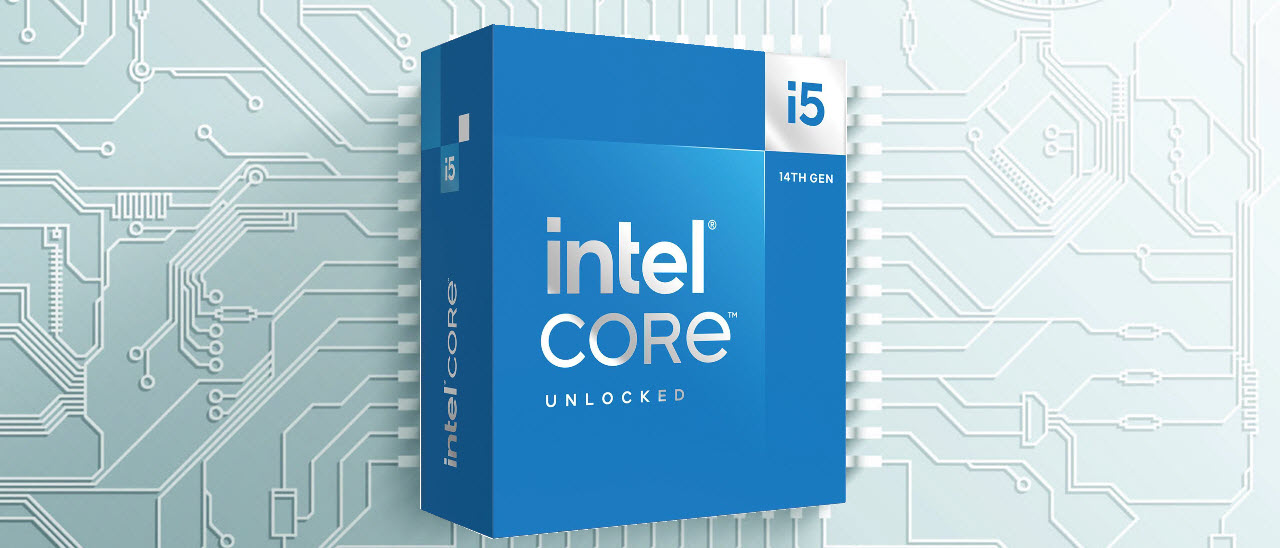
Intel Core i5-14600K
Our expert review:
Specifications
Reasons to buy
Reasons to avoid
Our in-depth testing shows that the $235 Core i5-14600K is a strong gaming chip. You can also sacrifice the integrated graphics engine — you won't need it if you have a discrete GPU — and go with the $200 Core i5-14600KF and get the same level of performance. Intel has since released the newer $320 Core Ultra 5 245K, but it offers virtually the same performance in gaming as the Core i5-14600K, but for $85 more. That leaves the Core i5-14600K as the better option in this price range for now.
The Core i5-14600K comes with six threaded P-cores that operate at 3.5 / 5.3 GHz and four E-cores that run at 2.6 / 4.0 GHz, for a total of 20 threads. That's paired with 20MB of L3 and 24MB of L2 cache.
The chip supports 16 lanes of the leading-edge PCIe 5.0 interface and an additional four PCIe 4.0 lanes for a speedy M.2 SSD port, and it also supports either DDR4 or DDR5 memory. Some gamers will enjoy the lower price and comparable performance of DDR4, but you can step up to the slightly more expensive DDR5 if you need access to more memory throughput.
The 14600K comes with a maximum power rating of 181W. The power consumption threshold allows the chip to work well with a wide variety of standard air and water coolers, but you'll need to ensure your model supports the LGA 1700 socket.
Speaking of which, you'll also need a 700 or 600-series motherboard for the processor (with 600-series, make sure the BIOS supports the chip). You can find a wide selection of high-end models that support DDR5 memory, and although you'll find fewer lower-end and mid-range DDR4 motherboards, there's still plenty of selection available.
Read: Core i5-14600K Review
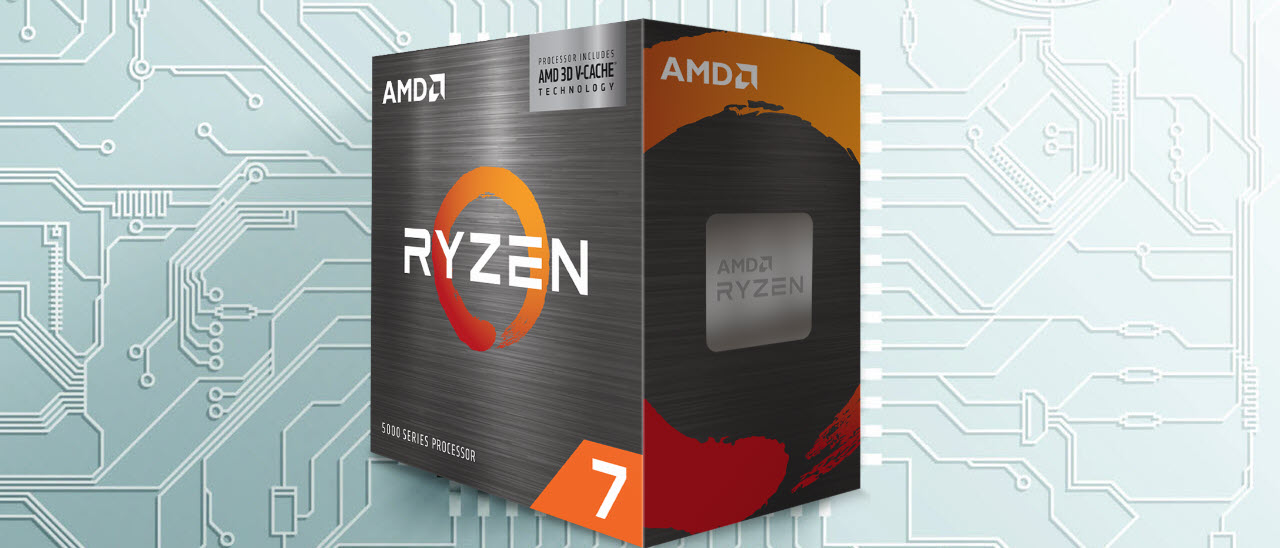
AMD Ryzen 7 5700X3D
Our expert review:
Specifications
Reasons to buy
Reasons to avoid
The $229 Ryzen 5 5700X3D offers the fastest possible gaming performance in the ~$200 price range, bar none, but it does come with some performance tradeoffs in productivity applications.
The Ryzen 7 5800X3D is the king of the gaming hill for the Ryzen 5000 series, but the 5700X3D has the same number of cores for 35% less cash while delivering 91% of the gaming performance of its more expensive counterpart. That's a win for value gamers and brings AMD's vaunted game-boosting 3D V-Cache tech to a new lower price point.
The Ryzen 7 5700X3D is basically a down-clocked Ryzen 7 5800X3D, losing 400 MHz off its base and boost frequencies. All other details remain unchanged, including the voluminous 96MB of game-boosting L3 cache.
The Ryzen 7 5700X3D drops into existing socket AM4 motherboards dating back to the 300-series, which debuted in 2017. Thus, it makes a great high-performance drop-in upgrade for Ryzen owners on the AM4 platform.
You have to be aware of the tradeoffs with this highly specialized chip. Our gaming benchmarks show that the 3D V-Cache doesn't boost performance in all games, though we found that it impacted nearly every title we tested. The Ryzen 7 5700X3D is optimized specifically for gaming but isn't as fast as similarly priced chips in productivity applications. Also, the Ryzen 7 5700X3D doesn't support the latest leading-edge connectivity options, like DDR5 and PCIe 5.0.
If you're willing to accept lower performance in productivity applications and do your homework to ensure the Ryzen 7 5700X3D accelerates the types of games you play frequently, it's hard to go wrong—especially for upgraders with AMD AM4 systems.
Read: Ryzen 7 5700X3D Review
Highest Performance Best CPU for Gaming - $400+
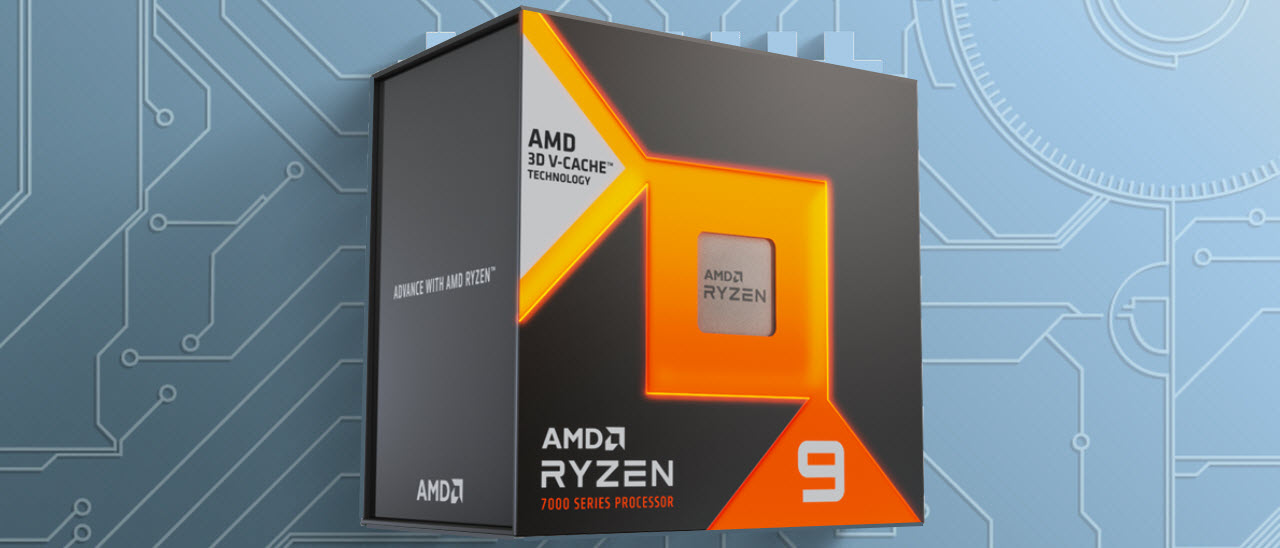
3. AMD Ryzen 9 9950X3D
Our expert review:
Specifications
Reasons to buy
Reasons to avoid
Zero compromises. That was AMD's mission when it designed the Ryzen 9 9950X3D; from our testing, that mission was a rousing success. AMD's 3D V-Cache technology has proven to be the killer tech that delivers dominating performance over Intel in gaming, and the second-gen revision propels the 16-core, 32-thread $699 Ryzen 9 9950X3D to a whole new level of gaming performance — all while preserving the full performance in productivity applications, a first for AMD's gaming-optimized X3D chips.
Our CPU benchmarks show the 9950X3D is an incredible 37% faster than Intel's flagship Core 9 285K on average in 1080p gaming. It also beats Intel’s fastest competing gaming chip, the Core i9-14900K, by 26% on average in our test suite. In fact, on average, the 9950X3D even ties the hands-down best CPU for gaming on the market, the Ryzen 7 9800X3D.
The Ryzen 9 9950X3D is impressive in productivity work, too, matching the standard Ryzen 9 9950X in our overall measure of both single- and multi-threaded workloads, an impressive accomplishment. It’s also 11% faster than the competing Intel Core Ultra 9 285K in threaded workloads, though Intel does maintain a 7% lead in single-threaded work.
The Zen 5-powered Ryzen 9 9950X3D comes armed with 16 cores, 32 threads, 144 MB of total cache, and a peak boost clock rate of 5.7 GHz. It drops into Socket AM5 motherboards.
The 9950X3D uses AMD’s cutting-edge 3D chip-stacking technology, 3D V-Cache, to enable an incredible 128MB L3 cache. AMD's game-boosting 3D V-Cache tech is now in its third generation, and this time around, AMD moved the vertically-stacked 64MB L3 cache chiplet from the top to the bottom of the compute chiplet to enable higher thermal headroom. As a result, the 9950X3D has the same 170W/230W TDP threshold as the standard Ryzen 9 9950X model instead of the 50W lower rating the company used with the previous-gen chip. That unleashes the ultimate in performance.
For those searching for the highest-end performance money can buy, if you can afford it, you won't find a mainstream desktop PC chip that offers a stronger blend of gaming and productivity performance.
Read: AMD Ryzen 9 9950X3D Review

Intel Core i9-14900K
Our expert review:
Specifications
Reasons to buy
Reasons to avoid
The prior-gen $438 Core i9-14900K is now selling for all-time low pricing, primarily because the newer $629 Core Ultra 9 285K has arrived to take its place. However, the Core Ultra 9 285K is actually slower than the 14900K in gaming, so it isn't a suitable replacement — at least not yet, but Intel is issuing patches in early December 2024 that will improve the 285K's gaming performance. Naturally, we won't know if those patches will change the balance of power until they arrive, so the 14900K is the better chip for now.
You should be aware that the much more economically-priced $339 14700K (listed above) is only 2% slower than the 14900K in gaming but costs roughly $100 less. The Ryzen 7 9700X, also listed above, is also less expensive and effectively ties the 14900K in gaming.
However, there are Intel fans willing to pay extra for the absolute most gaming performance they can get from an Intel platform. Also, the 14900K does offer more multi-threaded horsepower than the 14700K and 9700X, which could be useful if you game, stream, and record simultaneously or do other heavy multi-tasking while gaming. Just make sure that your use case justifies the extra cost.
The 14900K sports leading-edge connectivity, supporting DDR4-3200 or up to DDR5-5600 memory, along with 16 lanes of PCIe 5.0 and an additional four lanes of PCIe 4.0 from the chip for M.2 SSDs.
The chip comes with eight P-cores that support hyper-threading and 16 single-threaded E-cores for a total of 32 threads. The P-cores have a 3.2 GHz base, and peak frequencies reach an amazing 6.0 GHz with Turbo Boost Max 3.0 (this feature is only active on P-cores). Meanwhile, the E-cores have a 2.4 GHz base and stretch up to 4.4 GHz via the standard Turbo Boost 2.0 algorithms. The chip also has 36MB of L3 cache and 32MB of L2.
This 14900K has a 125W PBP (base) and 253W MTP (peak) power rating, but we recorded considerably lower power consumption than its prior-gen counterpart. You'll need to buy a capable cooler for the chip, and you'll also need either a new 700-series or a previous-gen 600-series motherboard. You can find a wide selection of high-end motherboards that support DDR5 memory, and although you'll only find lower-end and mid-range DDR4 motherboards, there's still plenty of selection available.
The lower price of DDR4 might entice some gamers, but you'll lose anywhere from 5 to 8% of gaming performance with higher-end Intel chips. You can step up to the slightly more expensive DDR5 if you need access to more memory throughput and, thus, every bit of performance possible.
Read: Intel Core i9-14900K Review
Best Budget CPU Pick - $100 to $150
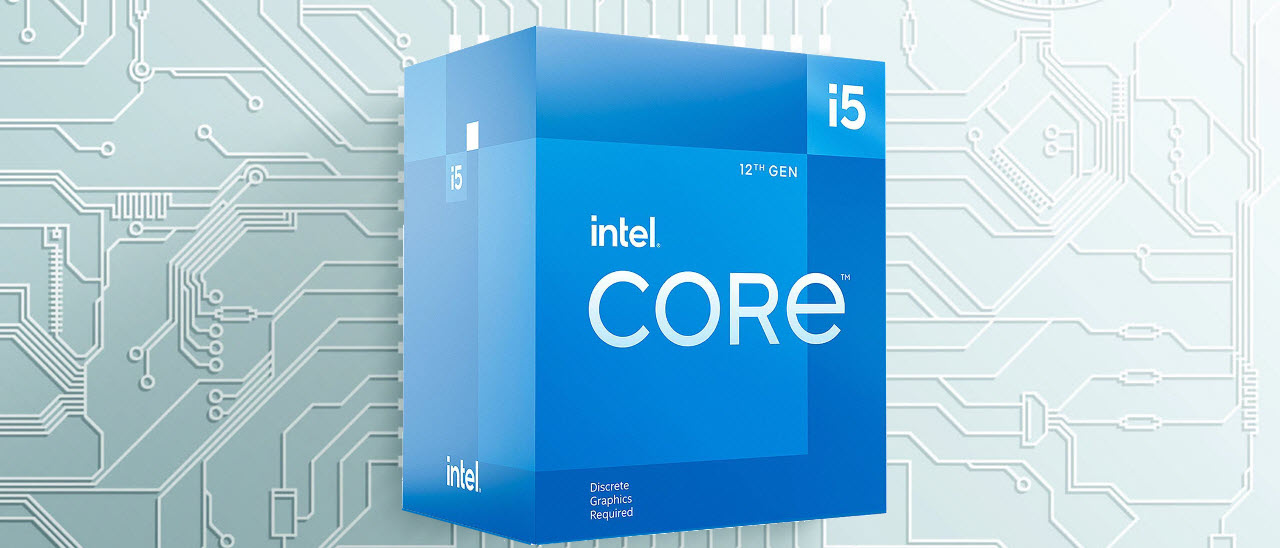
4. Intel Core i5-12400F
Our expert review:
Specifications
Reasons to buy
Reasons to avoid
At $110, the graphics-less Core i5-12400F is an exceptional value, and you can step up to the $130 Core i5-12400 if you need integrated graphics. This chip is slightly faster than the alternate in this class, the Ryzen 5 5600 listed below, in both gaming and productivity work. The 12400F's connectivity features and more modern platform are the big selling point, though. If you're looking for support for more modern interfaces, like PCIe 5.0, DDR5 and DDR4, this chip makes even more sense -- AMD's Ryzen 5 5600 only supports DDR4 and PCIe 4.0.
The Core i5-12400F comes with six P-cores and 12 threads, but it lacks e-cores. In contrast, its predecessor and our top pick above, the 13400F, comes with four e-cores to add more performance in threaded workloads. The 12400F has a 2.5 GHz base clock and boosts up to 4.4 GHz. The chip also comes with 18 MB of L3 cache and has a 65W PBP (base) and 117W MTP (peak) power rating.
The Core i5-12400F drops into the cheap and plentiful Socket 1700 ecosystem, so 600- and 700-series boards are fine. Naturally, a B-series model will be the best logical pairing for this class of chip. These come in either DDR4 or DDR5 flavors, so be sure to match your motherboard to the type of RAM you choose to use.
The Core i5-12400F also comes with a competent bundled cooler, but we always recommend stepping up to a more capable third-party model, some of which can be found as for as low as $20 if you're particularly price sensitive. All in all, the Core i5-12400F at this price point is a solid chip for a budget system.
Read More: Intel Core i5-12400F Review
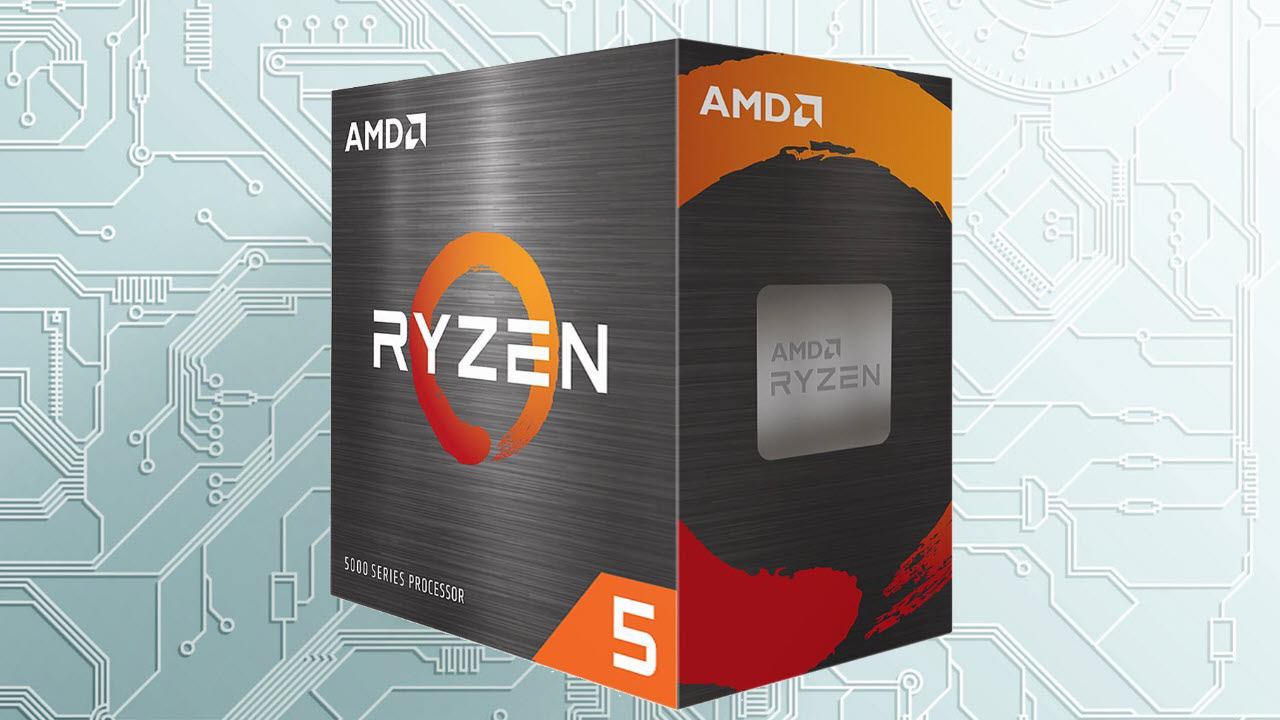
AMD Ryzen 5 5600
Our expert review:
Specifications
Reasons to buy
Reasons to avoid
The $107 AMD Ryzen 5 5600 delivers a solid blend of performance in both gaming and productivity applications, bringing a new level of value to the Zen 3 lineup. If you're fine sticking with a previous-gen AM4 motherboard, the Ryzen 5 5600 makes a great budget build. The primary trade-off for the AM4 platform is that you're limited to DDR4, and you don't have access to PCIe 5.0, but this isn't a problem for most users at this price point. However, the Core i5-12400F is a better deal if you're looking for DDR5 and PCIe 5.0 support.
The Ryzen 5 5600 also makes an absolutely unbeatable budget chip if you're updating a first-gen Ryzen system. The 5600 unseats the Ryzen 5 5600X, a long-time favorite. The 5600X is only a mostly imperceptible ~1% faster in gaming and multi-threaded PC work than the non-X model, but provides a 4% advantage in single-threaded work.
You can find the six-core 12-thread Ryzen 5 5600 at $107, a deep discount brought on by competitive pressure from Intel. In fact, our testing shows that the Ryzen 5 5600 generally matches the gaming performance of its more expensive sibling, the ~$175 Ryzen 7 5800X. That makes the 5600 an incredibly well-rounded chip that can handle gaming well, from competitive-class performance with high refresh rate monitors to multi-tasking gaming workloads like streaming, while also serving up more than enough performance for day-to-day productivity apps. As with all AMD CPUs for gaming, you can fully overclock the CPU.
The Ryzen 5 5600 has a 3.7 GHz base and 4.6 GHz boost clock. The chip also has a 65W TDP rating, so it runs cool and quiet. Existing AMD owners with a 500-series motherboard will be happy, as the 5600X drops right into existing 500-, 400-, and 300-series motherboards. If you need a new motherboard to support the chip, AMD's AM4 motherboards are plentiful and relatively affordable, with the B-series lineup offering the best overall value for this class of chip.
Read: AMD Ryzen 5 5600 Review
Entry-Level Best CPU for Gaming - For gaming on integrated GPUs
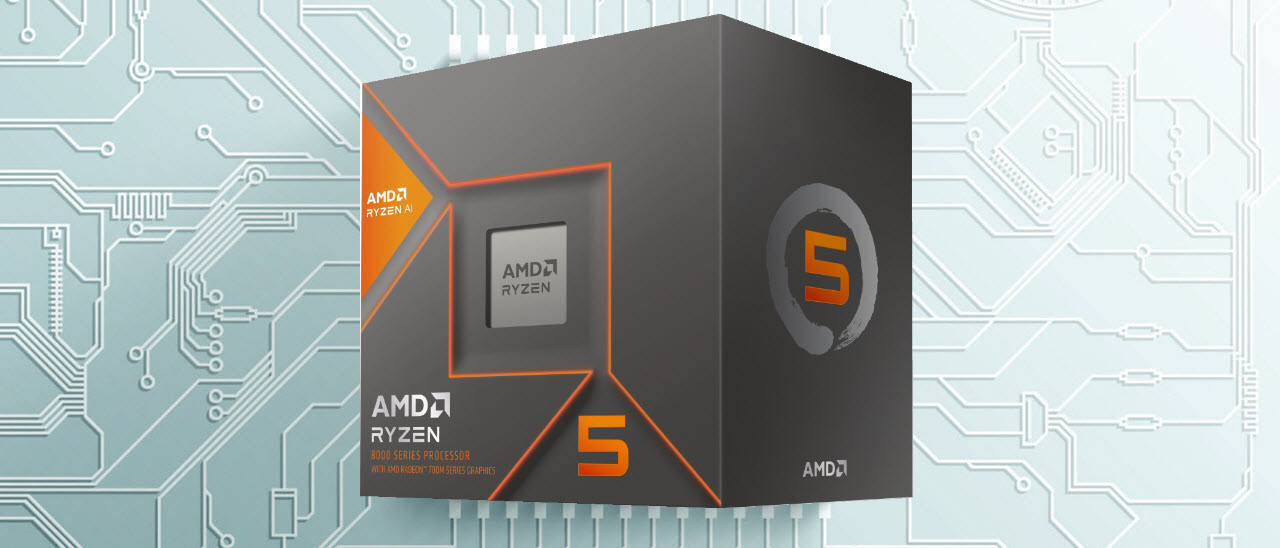
5. AMD Ryzen 5 8600G
Specifications
Reasons to buy
Reasons to avoid
The $278 Ryzen 7 8700G, AMD's flagship APU, delivers the fastest performance on the market from integrated graphics, bringing passable 1080p gaming to the desktop PC without a discrete graphics card, but its high price point relegates it to a niche audience. In contrast, the $170 Ryzen 5 8600G delivers 90% of the 8700G's performance but for ~$110 less, making it a solid alternative for gaming systems that don't use a discrete GPU.
Naturally, you'll have to accept lower fidelity settings and be realistic about which titles can play at 1080p resolution. Still, AMD's Hyper-RX suite of features, which includes in-driver Radeon Super Resolution upscaling tech, frame generation with AMD Fluid Motion Frames (AFMF), Anti-Lag+, and Radeon Boost, helps boost performance at a slight cost to image quality. This new feature set, a first for AMD's iGPUs, is a boon for budget gamers.
The Ryzen 5 8600G has six Zen 4 CPU cores and the RDNA 3 GPU engine with eight CUs. The Ryzen 5 8600G drops into the AM5 platform, with value-focused B650 and A620 motherboards being the obvious best combination. These systems offer a new level of connectivity for AMD's APU processors, which were previously on the aging AM4 platform but require DDR5 memory. That adds some cost, so do a value analysis before selecting this processor. If you're looking for the lowest entry price possible with an APU, the Ryzen 5 5600G listed below slots in as the value alternative.
The Ryzen 7 8600Gs only supports 16 usable lanes of PCIe 4.0 connectivity, while other processors on the AM5 platform support PCIe 5.0. However, we don't feel this will impact this class of system.
More: AMD Ryzen 7 8700G and Ryzen 5 8600G Review
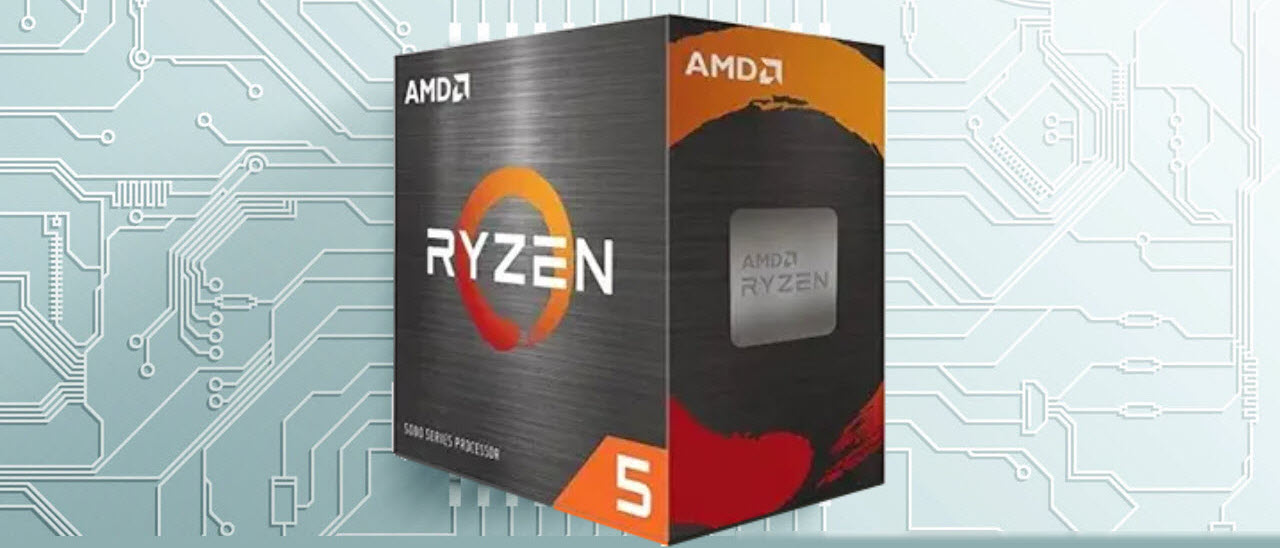
AMD Ryzen 5 5600G
Our expert review:
Specifications
Reasons to buy
Reasons to avoid
The Ryzen 5 5600G steps into the arena as the value champ for APUs, which are chips with strong enough integrated graphics that they don't require a discrete GPU for light gaming—just be sure you're willing to accept lowered quality settings.
At $120, the Ryzen 5 5600G gives you 96% of the gaming performance on integrated graphics than its more expensive sibling, the $160 Ryzen 7 5700G, but for 25% less cash. Our testing shows that its level of performance makes it the best value APU on the market. As long as you're willing to sacrifice fidelity and resolution and keep your expectations in check, the Ryzen 5 5600G's Vega graphics have surprisingly good performance in gaming.
The 5600G's Vega graphics served up comparatively great 1280x720 gaming across numerous titles in our tests, but options become more restricted at 1080p. Of course, you can get away with 1080p gaming, but you'll need to severely limit the fidelity settings with most titles.
With eight cores and 16 threads that operate at a 3.9 GHz base and boost up to 4.4 GHz, the Ryzen 5 5600G also offers solid performance for its price point in standard desktop PC applications. The chip also comes with a bundled Wraith Stealth cooler, sweetening the value prop, and drops into existing 500-series and some 400-series motherboards, though support on the latter will vary by vendor.
If your budget is tight and you're looking to build a system for modest gaming, you should check out our Best Cheap CPU feature. Some of those chips can deliver passable gaming performance without a graphics card, and their prices start at just $55 (£40).
Read: AMD Ryzen 5 5600G Review
- MORE: CPU Benchmark Hierarchy
- MORE: AMD vs Intel
- MORE: Best Cheap CPUs
- MORE: Best CPUs for Workstations
Stay On the Cutting Edge: Get the Tom's Hardware Newsletter
Get Tom's Hardware's best news and in-depth reviews, straight to your inbox.

Paul Alcorn is the Managing Editor: News and Emerging Tech for Tom's Hardware US. He also writes news and reviews on CPUs, storage, and enterprise hardware.
-
abryant Archived comments are found here: http://www.tomshardware.com/forum/id-3795320/cpus.htmlReply -
davidm.maya mmm What about the i5-9600K ? Why are you actually recommending to buy earlier generation processors? Going against your own recommendations?Reply
I can understand why the i5-8400 got the 1st place but I can't get it why are you still recommending i5-8600K given that the i5-9600K is very close in price from the new generation and better. -
totalinsanity4 Given that the R5 2600 is only $1 more than the 2400G, why not replace that as the budget pick? Two more cores and four more threads are definitely beneficial, ESPECIALLY at that price pointReply -
gx240 I'm actually curious about the i5-9600K too. Its price seems to be almost identical to the i5-8600K. For the last week I've seen it selling for about $10 to $30 dollars more for an appreciable increase in boost frequency. Any reason not to recommend it?Reply -
kiniku I just ordered the 9700K for my new build. It was splitting hairs between the 2700X, but I have a 35" G-Sync monitor, and I game 95% of the time. While the cost is higher, I feel the 9700K covers all the bases.Reply -
dekfin6 CPU is one of the important parts of the computer or laptop so it I very important to have the best quality CPU and for my point of view AMD Ryzen 7 2700X, AMD Ryzen Threadripper 2950X, AMD Ryzen 5 2600X, Intel Core i5-8600K also can take help from windows error code 0x8024a105 and also has any query then also it will help you.Reply -
gibo.w.tk I am going to play at 3440x1440p at 200hz and hdr with the new acer x35 should I get a 9900k or 8086k and a rtx 2080 ti for gaming only, for my upgrade of a fx 4300 and gtx 1050.Reply -
SR TEE I have my disagreements with these ratings. I'd still think an overclocked I7 8700K would be the best gaming CPU at the moment for the price and availability, but if I looked at it in a future sense the R7 2700X would be the best value choice considering how often Intel changes their sockets and leaves their customers high and dry with no upgrade path beyond two CPU generations.Reply
I also disagree with the Ryzen 2400G for that price range, the R5 2600 is going for around $160(on some sites has gone up to $200 though) and if gotten at that price it beats out the R5 2400G.
Now with an R5 2600 at $160 that kind of displaces the Intel I5 8400 a little bit. If that's the case you may as well go up to the R7 2700 or maybe an Intel I5 8600K.
Just my opinions, but as prices change and the value propositions are altered my opinion will change as well. -
xravenxdota Reply21541164 said:I have my disagreements with these ratings. I'd still think an overclocked I7 8700K would be the best gaming CPU at the moment for the price and availability, but if I looked at it in a future sense the R7 2700X would be the best value choice considering how often Intel changes their sockets and leaves their customers high and dry with no upgrade path beyond two CPU generations.
I also disagree with the Ryzen 2400G for that price range, the R5 2600 is going for around $160(on some sites has gone up to $200 though) and if gotten at that price it beats out the R5 2400G.
Now with an R5 2600 at $160 that kind of displaces the Intel I5 8400 a little bit. If that's the case you may as well go up to the R7 2700 or maybe an Intel I5 8600K.
Just my opinions, but as prices change and the value propositions are altered my opinion will change as well.
I personally would pick the 8700k over any 99xx series as i agree the price to performance on the 99x models are just not there.The 9900k are almost double the price of a 2700x here.
On the second one.I built my brother a 2400g which was a budget built for the fact he doesn't need a dedicated gpu to play games.I went with the 2600 as i have a gpu so it made more sense.I will agree the 2600 are by far the budget king but for the same price the 2400g as a igpu.
My brother will get this 1050ti of mine when i upgrade during this month but as when i built his pc his value was far better as mine as he did not have to by a gpu to play games out of the box.